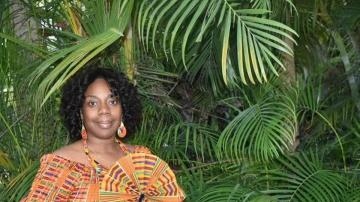Black in Every Shade: Instilling Black Pride in Afro-Latino Children
Growing up in New Jersey in the ’80s as a first-generation Cuban-American, Sara Valdez didn’t always feel understood

Growing up in New Jersey in the ’80s as a first-generation Cuban-American, Sara Valdez didn’t always feel understood. The most popular representation of a Cuban was Desi Arnaz, aka Ricky Ricardo. Images of Black Cubans were virtually non-existent. So much so that when people heard Valdez speaking Spanish as a child, they asked her how she learned.
“I’ve learned to deal with the ignorance of people,” she said.
While Valdez’s phenotype may have been commonplace in her ancestral home, she had to grapple with what her identity meant in America.
“As an Afro-Latina, noticing my Blackness—growing up, especially here in the States—it’s very difficult to find the middle ground of your Afro-Latina-ness, unfortunately.”
She looked to other Black communities across the diaspora for guidance.
“I learned it from Black Americans and Caribbean people like Jamaicans and Haitians. That’s how you learn about your culture.”
From there, Valdez dove into the history of Black people in different corners of the world. What she discovered helped establish not only a place for herself in the world—but pride as well.
That pride has lasted beyond her own childhood. It lives today through her advocacy work with Afro Latina World, a group comprised of Afro-descendant and Afro-Indigenous people. The organization was created to celebrate the heritage, resilience, and unity of Afro-Latinas, while simultaneously recognizing and calling out the systems of social discrimination that have actively suppressed the community.
Launched in 2017, Valdez and the group host several cultural events in Miami, teaching the next generation of Afro-Latinas to embrace their roots.
“We teach children how to dance,” Valdez explained. “It could be Rumba, Salsa, or Merengue. We also provide classes for adults—anyone who’s interested in learning African history, the history of Black people in South America, Central America. We provide those classes.”
Valdez says it’s important to instill this type of cultural pride from a young age.
“When people learn their history—and everybody’s history in general—I think it helps bring about a better generation where people are more informed and understand more of humanity itself.”
As the mother of four boys, Valdez makes sure they are present with her as she does this work.
“Teaching them about the culture is extremely important,” she said. “We went to the Miami Calle Ocho Festival and brought Afro-Latino representation—and I brought my children with me. Last year, we went to Cuba for a week. We brought hygiene products for women and food to give to the community. I try to bring my children to these great events so they can absorb and learn from the culture.”
In just one generation, Valdez has helped her children find the sense of belonging she lacked as a child.
“Education is the key,” she said. “That’s how I was able to get to the conclusion that I got to. Unfortunately, schools here in the States don’t teach you. They lump everybody together—‘We all come from slavery.’ But we all come from the same place, which is Africa. We just got dispersed. That division we have among us has to stop. We need to unite.”
Valdez is adamant that for confidence and pride to truly take root, the education must begin early.
“If you teach your kids right, I think it makes a better world for all of us,” she said.



